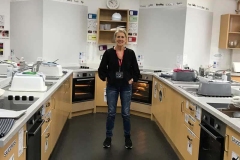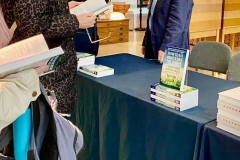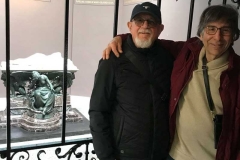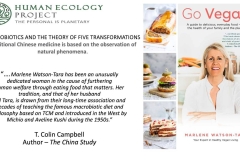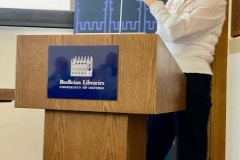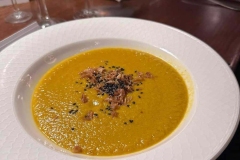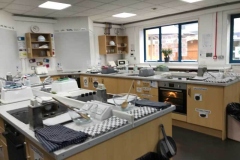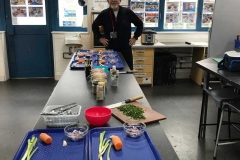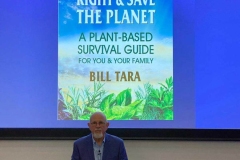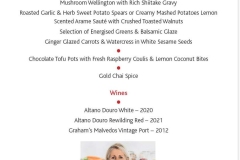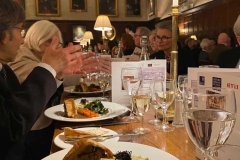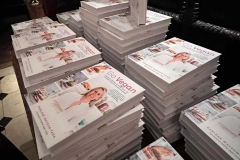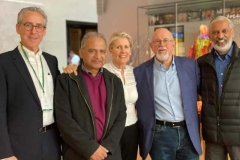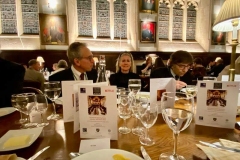Coming Together, Working Together with Education
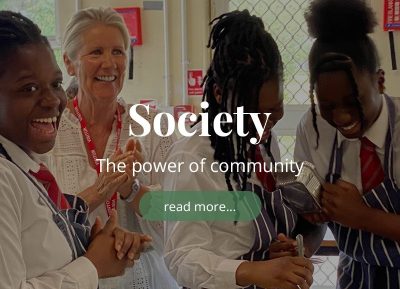
Never in modern history has there been such an interest in food and at the same time, such a lack of confidence in the basic quality of food. Today, health is an increasing concern for people around the globe. The rise of chronic illnesses affects not only individuals and families but also society as a whole. We are creatures of habit.
Those habits are influenced by family, society and a complex web of personal experiences. It is a combination of practical life skills, education and the desire to change that will point us in the direction of a greater experience of well-being.
Community Outreach
Body autonomy is an essential tool for creating a healthy society. The educational programmes that we have been teaching in schools cover the health philosophies of ancient cultures and indigenous people where we can observe ideas that were completely based on understanding the relationship of individuals to the natural and social environments.
This ancient wisdom has been lost and must be resurrected. There is much work to do on this topic and we plan to continue to reach as many schools and community centres as possible. Sharing our free programmes, including a short cooking session, is education at its best. The feedback has been fantastic.
Being ‘normal’ when society is so sick is not a good action plan. When we look at society as a whole, what we see is unfortunately taken as a group we are not very healthy. This is not only a personal issue; it is reflected in the emotional and physical effects of disease on families and society.
In good health

Unravelling The Myth About Fish
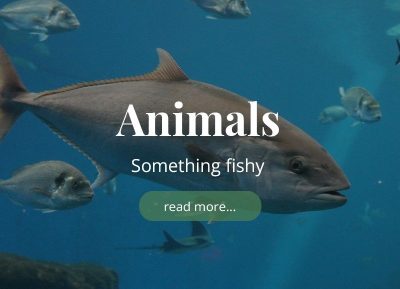
We have written about the problems with eating fish in the past and our eBook, Let’s Keep Fish in the Sea, gives lots of details, but it’s worth addressing again.
It is amazing the number of people who still believe that eating fish is not only healthy but is a good environmental choice. One of the narratives that is commonly raised is that it is a healthy alternative to mammal meat or chicken. Some even relate to it as a health food. Self–described pescatarian diets have become the rage. They claim that it is the healthiest diet, nothing could be further from the truth.
"The need for animal-sourced protein has been disproven by hundreds of scientific studies. This is in addition to the fact that fish are one of the most polluted foods available. People who are committed to eating an “organic, chemical-free diet will often consume fish while the levels of chemical pollution in the ocean are critical. This pollution is comprised of industrial toxins, agricultural runoff, air pollution and consumer plastics. This is the sea that all aquatic life must live in and feed on. "The need for animal-sourced protein has been disproven by hundreds of scientific studies. This is in addition to the fact that fish are one of the most polluted foods available. People who are committed to eating an “organic, chemical-free diet will often consume fish while the levels of chemical pollution in the ocean are critical. This pollution is comprised of industrial toxins, agricultural runoff, air pollution and consumer plastics. This is the sea that all aquatic life must live in and feed on.
What About Cholesterol?
Regarding the proposed health benefits of fish on cholesterol, those attempting to lower their cholesterol might like to know that three ounces of shrimp contains over twice the amount of cholesterol as the same serving as a T–bone steak. Between 15 and 30% of the fat in fish is saturated depending on species and over 50% of the calories in salmon comes from fat.
The Omega 3 fats, so prized in some dietary regimes, fail to mention that the vegetable sources are richer in alpha-linolenic acid, the only essential omega-3 that our bodies need. These healthy fats can be found in chia seeds, walnuts, soybeans, greens such as kale, broccoli, and Brussels sprouts as well as sea vegetables. Please view our advisory board member Dr Tim Radak's excellent interview on nutrition that covers omega fats in an easy-to-understand fashion.
Fish Farming
Because of the dwindling stocks of ocean fish, fish farming has grown rapidly all over the world. Driven by the myth of animal protein requirements, it is a major growth industry. Soon it will outproduce poultry production because it is cheaper. Anyone who thinks that farmed fish are a healthy choice should visit a fish farm and observe where the fish live and eat. The waters are filthy and filled with excrement, and the fish must be given regular doses of antibiotics to keep down the rates of infection.
The use of fish is generally driven by the stubborn resistance to the belief that flesh, some kind of flesh, is needed to be healthy. Eating a diverse wholefood plant-based vegan diet provides all the nutrition essential for a healthy life. An added advantage is that we are not contributing to the decimation of life in the ocean. It’s a win-win decision.
In good health

How Society is Crossing Lines of Climate Crisis
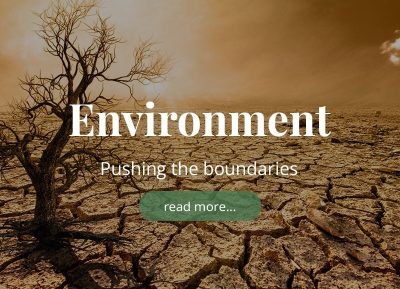
During a speech in London this past April, UN Climate Change Executive Secretary Simon Stiell gave a stark warning. It was his analysis that the world has only two years left to put a stop to the damage being done to the health of society, the environment and the world economy. (link to the speech below). Regardless of your opinion about the timeline, this is a very real crisis and we seem frozen and unable to respond.
No previous species of plant or animal has ever had the awesome power to break the balance of nature. Humanity claims to be at the pinnacle of evolution with immense intellect yet our actions do not reflect it. There is no denying that we possess many unique gifts and have developed an impressive list of skills. We worship our cleverness and the data we have collected and the technologies we have manufactured. But we have obviously not acquired wisdom.
According to the Stockholm Resilience Centre in Sweden we have already exceeded the danger boundaries of ecological collapse. These boundaries were first proposed in 2009 by a group of 28 internationally renowned scientists. They identified nine ecological boundaries that if crossed risk generating drastic and perhaps irreversible collapse. In their 2024 report, they show that six of these thresholds have been crossed.
Those six boundaries of danger are:
- Changes in fresh water sources
- Changes in land use
- Changes in climate patterns
- Increases in chemical pollution
- Excesses of nitrogen in farming
- Biodiversity loss
Each of these issues dramatically challenge environmental integrity and are difficult or impossible to claw back.
The good news is that the damage can be stopped by one simple act. We need to stop animal agriculture in its tracks. The main driver in all these boundaries is the raising of animals and fish for meat, eggs or dairy. This includes the monocropping of farmland, the chemical runoff of animal waste, the expansion of land to feed more animals and the use of ocean fish farms that pollute and spread disease.
Simply cutting back on animal-sourced food, Meatless Mondays or “mostly vegan” are not thoughtful responses. Anyone who is still using animal products and claims to love the planet needs to think again. This is not a time for holding onto the habit of eating food that is killing the earth. This is the time to live a life of commitment for all of life and help others do the same. Please check out both links below.
Two Years Left To Save The World
In good health

Self-Empowerment Is The Road To Health
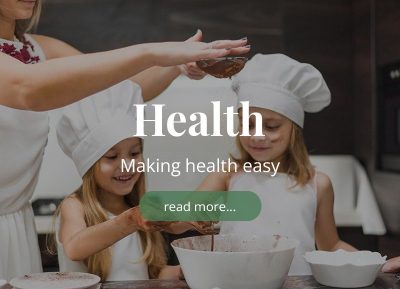
Much of our thinking about health is about a battle between invisible and mysterious adversaries that surround us and that we need to fight. We are “fighting” heart disease, we are “battling” cancer, and we will “conquer” diabetes. Who or what are we fighting? If the enemy is concealed behind a cloak of mystery, we are likely to leave the battle up to the professionals. This surrender of power is a dangerous move.
Creating health is about taking responsibility for our health. If the maintenance of our own health and stability is placed outside the domain of our personal control, it is not hard to understand how other social responsibilities fall increasingly and easily out of our hands as well. Our capacity to care for ourselves is fundamental to human existence. When we feel we have lost this capacity, it can create pervasive feelings of ineffectiveness and futility that permeate our actions. The concepts that influence our actions and thoughts about physical health are reflected in our attitudes about the condition of our minds and emotions.
The Health Triangle
The body has amazing powers of maintenance and protection. What is required is sticking to the simple rules of health such as a healthy diet (see What To Eat) exercise and a love of life. As the Harvard researchers discovered, when we are healthy, we resist disease. What others have discovered is that the resistance to common diseases of the body is also reflected in cognitive and emotional well-being. It is wise to understand what is making us sick so we can take effective action.
Our educational programmes address the health triangle with a fun and hands-on approach. The foundations for future health and well-being are laid in early life. Our cognitive development, lifelong weight status, physical activity levels, and communication skills create environments that build the social and emotional confidence of children, families and community.
In good health

Our School Projects Are Successful
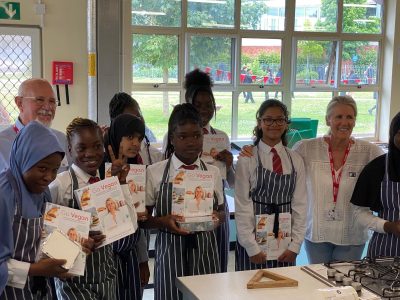
The laughter in the classroom said it all. Success was apparent by the look on all the pupil’s faces. The biggest compliment one can receive when teaching is to witness the sheer enjoyment of those participating, and, yes, that even included some of the teachers. The head teacher was delighted and asked Bill and me to return to teach a longer programme. This was music to our ears.
The practical session was fun and informative in both the schools where we recently presented our Human Ecology Project. My vegan burgers went down a treat and the pupils were very proud of their cooking skills.
Foundational Teachings
We answered many questions about what food is. It seems such a simple question, but when you delve into it, boy, does it open the door to a great conversation? My answer is always the same. That depends on what species we are talking about. What organism? Food can be defined as a substance that, when ingested, can be incorporated into flesh and blood. So, what the food is surely must be relative to the organism we are discussing.
The saying that one man’s meat is another man’s poison only applies between species. It doesn’t apply within the same species. Horses need what horses need; all chipmunks need what they need, and humans need what humans need. Humans thrive on a wholefood plant-based vegan diet of grains, beans, vegetables, fruits, nuts and seeds. These are the foods that are the foundation of our Human Ecology Diet.
We Lose A Beloved Friend and Colleague
We were saddened to hear that Dr John McDougall, a dear friend, colleague, advisory board member and avid supporter of our Human Ecology Project had passed peacefully at his home. Dr McDougall was a physician, speaker, and best-selling author who taught the importance of a whole food, starch-based diet to halt, reverse and heal chronic disease. We will miss you, John, thank you for your 60 years of incredible education sharing the truth with the world. RIP.
Video Interviews & Podcasts
We are always thrilled to share some wonderful words of wisdom from our advisory board. Enjoy these interviews with Dr. Sailesh Rao and Dr. Will Tuttle. Their presentations can be viewed on our YouTube Channel or listened to or viewed on our spotify channel.
It is a pleasure to have the opportunity to share our passion for a healthy world with you. Our main objective is always to educate in a fun and engaging way. The situation is not hopeless, there is much we can do to bring about change. A vegan world is what drives us both daily. Food is the central point for all living creatures.
Education is the most powerful tool we possess to assist us in moving toward a vegan world. Non-violent, peaceful presentations and bringing people together is the way forward.
In good health

Body Autonomy
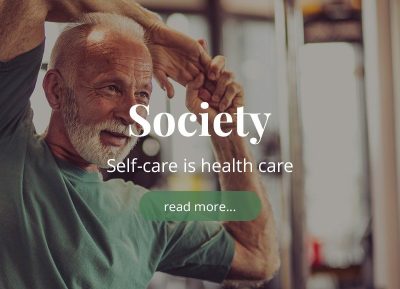
Health is an elusive mix of the physical and the emotional, the mental and the spiritual, the individual and the social, the logical and the intuitive. It is the diversity of these factors that can make defining health a difficult task. This may be the reason that we tend to separate these elements and compartmentalise our understanding.
The reductionist science that rules the practice of modern medicine serves to validate this approach. The lens of reductionism can certainly provide valuable insights and is especially useful when details are essential. It can also be a curse when we attempt to develop a deeper or more comprehensive understanding of the human condition. Our myopic focus leads us further away from the dynamic insights that are essential if we truly desire the kind of life that seems to be our true potential.
Be Your Own Doctor
In America, just about 18 percent of the GNP is spent on health care; in the Uk, the figure is 9.6 percent. Yet in an exhaustive survey done by the United Nations and published in 2000, America only ranked thirty–seventh out of 190 countries, and the UK ranked eighteenth. Something is seriously wrong, and money isn’t fixing it. One problem is that the growing demands and increased complexity of treatment creates an environment where mistakes are unavoidable. A 2013 report from the Institute of Medicine reported that there are 440,000 preventable deaths from medical errors annually in America. that makes medical error the third leading cause of death following heart disease and cancer.
Driven by pressure from the pharmaceutical industry and a cultural belief in the power of the pill, the abuse of prescriptive drugs grows yearly. An estimated forty–eight million Americans have abused prescription drugs (nearly 20 percent of the US population). Deaths by prescription drugs are more common than deaths by car accidents in America and far outstrip deaths by illegal drugs.
This is not to say that there is never a need for conventional treatment. Sometimes people need a doctor or a standard treatment. It is caution and taking the road of prevention as the priority. Education is the answer.
The Power of Simplicity
Western society is home to the highest rates of Non–Communicable Diseases (NCDs). these NCD’s include diabetes, heart disease, stroke, and many cancers. Taken together they are generally seen to be conditions that are caused by diet and other life–style habits. These diseases cause 85 percent of American deaths. The world average is higher than that, and at current rates, by the year 2030, NCD’s will cause 89 percent of all deaths in America. These are diseases that are mostly preventable by simple changes in the way we conduct our daily life.
Physical and Mental Health
Diet, exercise, environmental influences, sleep patterns and social behaviour would all be on a list of effective prevention. Most of these factors are simple, and not a secret. We seem to prefer to develop the problem and then ask the medical profession to give us something to reduce the symptoms. Addressing the breakdown of both physical and mental health does not require further analysis or the development of new drugs, surgeries, or biotechnologies. The answers to our present problems do exist. They are available if we focus our attention on the position of humanity in nature, re–evaluate the philosophy of life which underlies our modern civilization and accept responsibility for the creation of our present problems.
Being responsible for our actions is of the utmost importance for the development of our individual lives, and consequently our society. To realize our human potential, it is essential that we develop our own internal strengths and realize fully our capacity to positively affect our personal condition. The degree to which our basic human freedom is eroded by social institutions, political structure, health facilities, and welfare agencies is directly related to our inability, or unwillingness, to adequately care for ourselves.
What You Can Do
The simple tools essential for good health are available to us all. The science, wisdom traditions, and common sense tell us that to be healthy we need to make balance with the environment. There are many ways to do this but two important factors stands above the rest. What we eat has the biggest effect on our wellbeing. One of the most important acts we can take is to adapt to an earth friendly diet. Please download our free ebook, What To Eat to get more information on the simple yet effective ways to choose a healthy diet. The second most important factor is to exercise. Movement is medicine. Switch me on daily to breathe and stretch with me. Your body will love you for it. https://www.youtube.com/watch?v=lMtGXt1uPTU&t
In good health

The Birds & The Bees
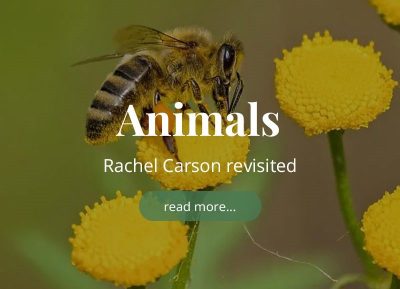
The first introduction to ecological thinking for many people was The Silent Spring by Rachel Carson. It is one of the many books on our students recommendation reading list. Rachel Carsons heartfelt observations of the damage done to nature by human activity took America and then the world by storm. Her observations were a warning shot about the dangers of chemicals on biological life.
Carson’s simple observation was that it seemed that birds were dying off for some reason. That reason was the use of pesticides developed during World War Two being used for pest control without any study of their effect on animal or human life. Their use, especially DDT was tragic.
While killing the insects being targeted, they also killed the birds and other creatures that ate the insects. This created a cascade of environmental damage and the public was outraged. Carson became a hero to many. The book received a great reception. She was given many awards. The chemical industry tried its best to undermine her, even accusing her of being a communist.
What Have We Learned? Not Much
As we move into the sixth mass extinction the loss of mammal species get the most attention, but it is the insects that are far more important. Insects are essential for all ecosystems. They are pollinators and recycle nutrients both above and below ground. They are also a major food source for birds, reptiles, amphibians, and fish. When insects are eaten by these animals they die out and plant life suffers from lack of pollinators. It seems that we don’t really care.
In spite of all the warnings and praise for the Silent Spring, it is now over 60 years and the same problem exists. It is worse now and for the very same reasons. The total mass of insects is falling by a precipitous 2.5% a year, according to the best data available, suggesting they could vanish within a century. In 10 years, you will have a quarter less, in 50 years only half left and in 100 years you will have none.
The new analysis selected the 73 best studies done to date to assess the insect decline. Butterflies and moths are among the worst hit. The number of widespread butterfly species fell by 58% on farmed land in England between 2000 and 2009. The UK had the biggest insect falls recorded, being more intensely studied than most places.
We Are Killing Our Own Life Force
Bees have also been seriously affected, with only half of the bumblebee species in the state of Oklahoma found in 1949 still present in 2013. This same loss was found in honeybee colonies all over the United States.
The main cause of the decline in insects is agricultural intensification. If you eliminate all the trees and shrubs that border the fields you are left with no natural habitat. That means the elimination of all trees and shrubs that normally surround the fields. Habitat loss with swaths of bare fields treated with synthetic fertilisers and pesticides are a death sentence for insect life.
The cause of this insect loss and its effects on other animal life is the same as observed in Silent Spring. We seem determined to spray toxic chemicals to produce more profit from our farmland at the cost of destroying all non-human life forms. Kurt Vonnegut wrote that we might be the first creature to decide that staying alive was not cost effective. How true.
What You Can Do
One of the most effective actions we can take to reduce toxic poison in the food chain is to stop buying products that are using them in their growing or manufacture. To the best of our ability, buy organically grown vegetables. If not available where you live keep asking and try to support local small farmers. The same is true with any product you need to buy, check your ingredients list and avoid those with multiple chemical items in the recipe.
Do Not Use Dangerous Sprays In Your Garden
Glyphosate is rarely used on its own, but as part of a chemical cocktail, for instance with the trade name Roundup or Weedol.
These formulations are potentially far more dangerous. Dr Robin Mesnage of Kings College London, writes "We know Roundup, the commercial name of glyphosate-based herbicides, contains many other chemicals, which when mixed together are 1,000 times more toxic than glyphosate on its own." Recent research has shown these other chemicals include arsenic, chromium, cobalt, lead and nickel.
Glyphosate is marketed as Roundup and is a popular herbicide for home gardens. It has been classified as a carcinogenic chemical that causes damage to the liver and kidneys. It is sold as a safe chemical but is known to poision worms and other organisms in the soil as well as animals eating sprayed plants.
Helping to preserve the environment and insect life means allowing your garden to encourage biodiversity. Encourage birds to visit your garden, they are great for natural control of aphids. Avoid the use of toxic powders, pellets, and sprays, especially those containing methaldehyde. If weeds are annoying to you then simply make a spray at home to use. A highly effective weed killer made in your kitchen by using white vinegar, salt, and washing up liquid. Both vinegar and salt are rich in acetic acid, which dries out and destroys weeds. Our planet is very fragile, please tread carefully. Check out our friends work over at https://veganorganic.net for some great content.
In good health

The Personal is Planetary
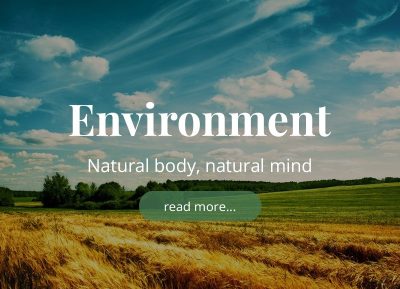
As a young boy growing up in Northern California, I was blessed with the opportunity to hike and camp in the woodlands of the Sierra Nevada and coastal ranges and to roam the rugged coastal cliffs and beaches. One of the highlights of every winter was when my father would take me to cliffs to watch the salmon returning to the river of their birth.
The rains would come, and the rivers would start to swell, and the salmon would gather off the coast. Standing on the cliffs, we could watch them swirl the water, silver in the reflected sun. They were coming back to renew the cycle of life. That they returned each year was miraculous and exciting. When the rains finally broke through the sandy mouth of the river, they would stir and leap into the silt brown waters to finish their journey. It never failed to make my heart race. It is a great sadness that my children and grandchildren will never see that sight.
The river has been altered from its former path. It has been widened and made shallow. Its banks have been dozed into levees to withstand an imagined flood. It is filled with grasses and algae—dank and unwholesome. The fish have been killed. Most of those coastal rivers are dead now. All the government studies in the world will not bring them back.
The Cost of Progress
It has become all too common to say that the despoiling of our environment is the price of progress. If this is so, we need to ask what this supposed progress has brought us. If we are healthier, then why do we need ever-increasing numbers of hospitals and more drugs to function? If we are happier, why do more and more people complain of stress, and why are an escalating number of children prescribed with antidepressants?
Human history presents a sad portrait of our collective behaviour. For every simple act of kindness, beneficial discovery, or creation of beauty, the scale is tipped dramatically by acts of brutality and stupidity on a massive scale. The qualities of violence, greed, and selfishness are dominant in the grand scale of human affairs and lie in sharp contrast to the guidance of the saints and sages we claim to admire the most. There is a deep disconnection between our stated humanity and our collective action.
Attempting to understand and explain this gap between our higher ideals and our most repellent actions has been the driving force behind religion, philosophy, and psychology. The troubling nature of our collective madness has never been this close to a critical breakdown. This collapse is not simply the result of new technologies of violence, escalating pollution, or increasingly sophisticated methods of political and economic suppression. The crisis we face is the suicidal destruction of the planet we inhabit. We are burning down the house and have no place to move.
Being The Future
The scope of this disastrous situation and the speed of its development create a special urgency to face the consequences of our actions and to alter the behaviour that created them. We cannot solve the problems of unwise political, economic, and technological decisions with the same mind-set and through the same institutions that created them in the first place. A different way of thinking is required, thinking that may lead us to truths that are not only inconvenient but also exceedingly uncomfortable. The good news is that the challenge we face could provide us all with an astounding opportunity to transform human life on the planet in a beautiful way.
What You Can Do
The first step is to model a healthy future in our daily life. The healthy future reflects our daily choices in the food we eat, our respect of the natural environment, and awareness of the impact of our participation in the consumer driven culture we live in. Small changes add up. None of this needs hinder our ability to speak out or demonstrate against injustice we see or address the issues of the day. The personal acts of kindness to all life, both human and non-human affirm the depth of our commitment.
In good health

Super Bugs For Super Health - How The Microbiome Protects The Gut
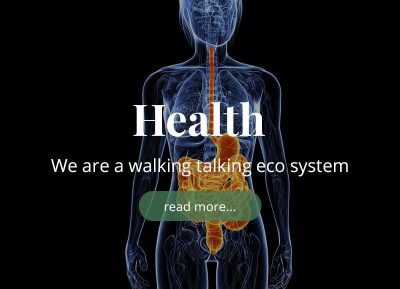
Did you know we are only 10 percent human? Ninety percent of our cells are nonhuman, microbial cells. Humans and our ancestors have evolved since the most ancient times with a commensal microbiota. This is the term used to describe the microbial environment that lives within the human body.
Since our diet influences our microbes, it’s true: we really are what we eat and absorb. A healthy well-balanced microbiota is essential for good health and longevity. Imbalances can impact the functioning of every single body system and speed disease process.
Good News & Bad News
The good news is that you can cultivate a new microbiota, formerly known as gut flora, quickly by changing what you eat. Bacteria that live in our intestinal tract, also known as gut bugs, flourish by munching on colourful, plant-based foods. We need to consider the microbiota, not just when treating gut disorders, but when considering metabolic dysfunction, recurrent infections, heart disease, mood disorders, neurological disorders, cognitive decline, energy levels, healthy ageing and so much more.
The bad news is that researchers discovered a new gut species, Ruminococcus. This gut species was previously unknown. It is essential for the digestion of cellulose from fibre to feed the good microorganisms in the gut. Western diets led to the disappearance of these gut bugs.
A recent study compared the microbiomes of people living in rural, hunter-gatherer, and industrialized societies. Ruminococcus were abundant in microbiomes of those from ancient hunter-gatherer societies. But the more urbanized a person is, the less of it they have.The main culprit? The lack of fibre in today's diet. Without enough fibre, Ruminococcus starve and gradually disappear from our gut.
Happy Bugs – Happy Me
The healthy gut bugs in our intestinal tracts are in charge by helping our bodies digest and absorb nutrients, synthesise certain vitamins, and rally against intruders, such as influenza and toxic cancer-forming carcinogens. In addition to boosting our immune system, microbiota sends messages to our brain and helps regulate metabolism.
Over time, microbiota forms colonies to combat obesity, type 2 diabetes, heart disease, autoimmune disease, and even certain forms of cancer. With 70-80% of immune cells being present in the gut, there is an intricate interplay between the intestinal microbiota, the intestinal epithelial layer, and the local mucosal immune system.
The Factor With The Greatest Detrimental Impact On The Microbiota is Antibiotics
Stanford University microbiologists Erica and Justin Sonnenburg have noted that it is very possible that there are very few Americans who have healthy gut microbiomes. They cite the overuse of antibiotics, sterile living environments, and dramatic changes in our diet as the most possible causes.
Central to the dietary issues is the lack of plant fibre in the diet. The biome needs the plant fibre to function. When plant fibre is scarce, the fermentation in the gut is starved of fuel and can’t reduce inflammation. SCFA’S (short chain fatty acids, especially butyrate improves mitochondrial function and mitochondrial health.
Butyrate is produced when the bacteria in the lower gut feast on fibre found in foods like whole grains, short grain brown rice, quinoa, oats, legumes such as beans, lentils, chickpeas, fruits, vegetables, nuts, and seeds.
What You Can Do
- Enrich your gut health by eating foods high in Inulin, an insoluble fibre that travels through our bodies from the small to large intestine, our colon. Once this insoluble fibre finds its way to the colon, it ferments into healthy microflora. Good sources of inulin include soybeans, oats, chicory, asparagus, garlic, leeks, and onions to name but a few.
- Load up on leafy greens. Glucosinolates latch onto carcinogenic intruders in our colon and remove them. Over the long run, this pays big dividends: Studies show people who eat the most cruciferous vegetables reduce their risk of colorectal cancer by 18 percent.
- All micronutrients work in concert with others, usually in pairs. The proper balance of these complimentary pairings cannot be worked out in the lab. It is the microorganisms in the gut biome that “decide” which nutrients to allow in and which to reject. This distinction is made according to what an individual needs, not what they think they want. This is why a simple, unprocessed, unfortified, diet is the healthiest.
- There are a number of factors that contribute to the health of your gut microbiome, including your environment, the amount of exercise and sleep you get, and of course, stress. But the number one factor that determines what microbes live in your gut (and which ones die off) is your diet.
- Download our free eBook, The Human Ecology Diet for ideas on creating a diverse healthy diet. https://humanecologyproject.com/what-to-eat/
In good health

Great Success with Our Oxford Presentations
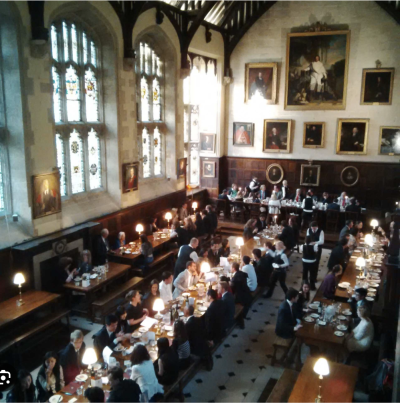
Dear Friends
Where does the time go? In the blink of an eye, the first quarter of 2024 seemed to pass very quickly. However, we are delighted to share that we are making great inroads with our educational programmes.
The Oxford Literary Festival was a wonderful success on all fronts, and we made many new connections. Bill and I were thrilled to have such good attendance at our presentations, (we will post our videos in the next newsletter). The resounding cheers around the great building at both gala dinners was a joy to behold. The hundreds of guests who dined on my vegan menu at each event loved my food. I am deeply grateful to the Head Chef and his team who did an amazing job.
The Green Room
Vegan sandwiches were served up buffet style in the green room every day. My selection of fillings was enjoyed by all. We mingled with so many wonderful authors from around the world who were asking us many positive questions about our vision for our Human Ecology Project. Opening doors to spread our vision for a healthy world for humans and non-humans alike will bring more and more people to the table.
Go Vegan
I signed over 200 copies of Go Vegan at the event, so, many more families will now be empowered to educate themselves and cook delicious vegan food. It's already been confirmed that we will both present next year and I will once again design the menus for the gala dinners that will continue to be vegan.
A huge thank you to Professor Gary L. Francione, Professor Anna Charlton and Sally Dunsmore SOI, Director, The Oxford Literary Festival for pioneering this first ever vegan festival.
Moving Forward with Our Schools Programme
The schools programme that we presented as part of continued education programmes at Oxford was also a great success. The kids had a wonderful time making my vegan burgers and all lined up to have their copy of Go Vegan signed. Such a joy to behold, to see the fun they all had. There was not a morsel of food left on their plates. We received such wonderful feedback from the teachers, who equally enjoyed the event.
Our next session is booked for July at another school in the area. These events are organised by Professor Stephen Law, Departmental Lecturer in Philosophy and Director of the Certificate of Higher Education at OUDCE. We are delighted to be working with Stephen, who will reach out to many schools with our programme.
Video Interviews & Podcasts
We are always thrilled to share some wonderful words of wisdom from our advisory board. Working online is important as we connect with many of our advisory board members from around the world. However, we were blessed to have an advisory board member, Dr. Sailesh Rao, founder of Climate Healers, with us in the UK. Sailesh came for lunch and, we had an excellent conversation regarding a study from the University of Copenhagen showing that, of the nine planetary boundaries, humanity has transgressed six of them beyond the limits of “safe operating space.” This interview will be available in our next newsletter. In the meantime, you can view Dr. Doug Lisle and Dr. Tim Radak interviews on our YouTube channel or listen or view on our podcast channel.
Every Picture Tells A Story
Please browse through the gallery images below to see just a few wonderful images that were captured throughout the event. From setting up cooking stations for the kids arriving at the school, to dining in the centuries-old incredible buildings at Oxford University, the whole event was magical. Of course, the icing on the cake, so to speak, was that the event was vegan.
As Bill and I say to everyone, we can learn to be positive, not through clichéd platitudes (“Just put on a happy face”), but by learning a new set of skills, like cooking deliciously healthy whole food plant-based meals, for starters. Education is the most powerful tool we possess to assist us in moving toward a vegan world. Non-violent, peaceful presentations and bringing people together is the way forward.
In good health



